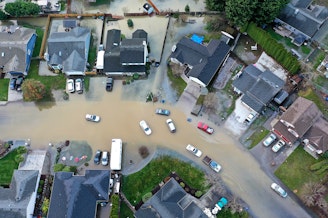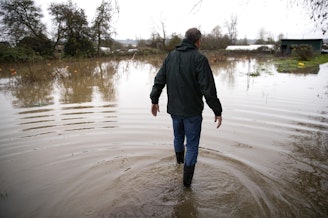There's algae in the water, Covid boosters being approved, and a monumental equipment sale, this week

Bill Radke reviews the week's news with Northwest News Network correspondent Anna King, New York Times technology correspondent Karen Weise, and Seattle Met Deputy editor Allison Williams.
This week President Biden announced you might be eligible for the Pfizer Covid vaccine booster shot - if you're 65 or older, have a medical condition that raises your risk of severe Covid symptoms, or are a frontline worker. But the question remains of who exactly is a frontline worker. Is it just doctors? Do teachers count? What about grocery store clerks, or bartenders? Plus, this week King County reached a deal with employee unions to push its vaccine deadline back to December, an agreement which also allows for paid leave if employees should contract the virus or experience vaccine side effects. How will this agreement impact vaccine hesitancy?
In non-Covid news, six dogs are dead or sick after coming in contact with Columbia River water near the Tri-Cities, and that number keeps growing. It's the result of toxic algae blooming in the river. Toxic algae isn’t yet well understood, good tests are still being developed and there aren't many federal regulations around these toxins — just recommendations and some state rules. So what's being done to keep dogs, and people, safe?
On Monday Amazon founder Jeff Bezos announced plans for $1 billion in conservation spending in places like the Andes, Congo Basin and parts of the Pacific Ocean. This is part of his previously announced Bezos Earth Fund, to which he pledged $10 billion last year. Bezos has promised to give away the full $10b by 2030. But how much of an impact will $1 billion split three ways have on the planet?
The workplace feels a little strange right now. American workers are quitting their jobs at record rates, and companies are struggling to hire new people to fill those voids. The hospitality industry has been facing a severe labor shortage for months, and it’s taking a toll on both businesses and current employees. Some employers, such as Dick’s Drive In, have responded by raising their minimum wage, and offering benefits. But still the shortage remains. What’s happening here?
Speaking of the labor market, Amazon is on a hiring bend again -- the tech giant is using big bonuses and other incentives to try and attract another 125,000 workers to the region. At the same time, this week California announced a new labor bill taking aim at working conditions in Amazon warehouses. The measure requires warehouses to disclose quotas and work-speed metrics to employees and government agencies, and prohibits penalties for workers stopping work to use the bathroom (among other activities that affect health and safety). It also prohibits retaliation against workers who complain. What would this bill look like in practice?
Sponsored
Finally - anybody on the market for $14 million dollars of farm equipment? One of the largest farm equipment sales in the nation just went off this Wednesday in southeast Washington. The Easterday family is selling their equipment after declaring federal bankruptcy because of one of the largest cattle swindle-schemes in U.S. history. Cody Easterday made up a fictitious cattle herd and falsely charged Tyson Fresh Meats for their care and feeding — all for a full decade. Since the scheme was exposed, Easterday has been charged with paying more than $244 million in restitution. But there’s more coming up coming up: Cody Easterday will be sentenced Oct. 5 for federal fraud charges.






